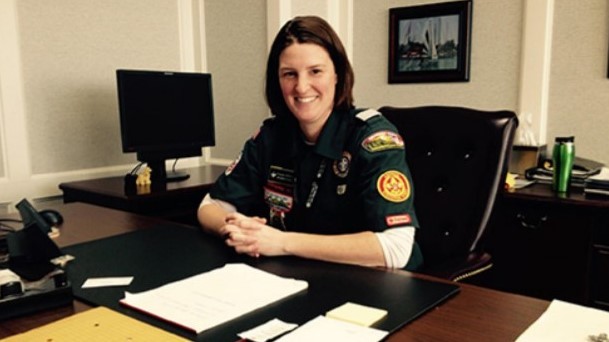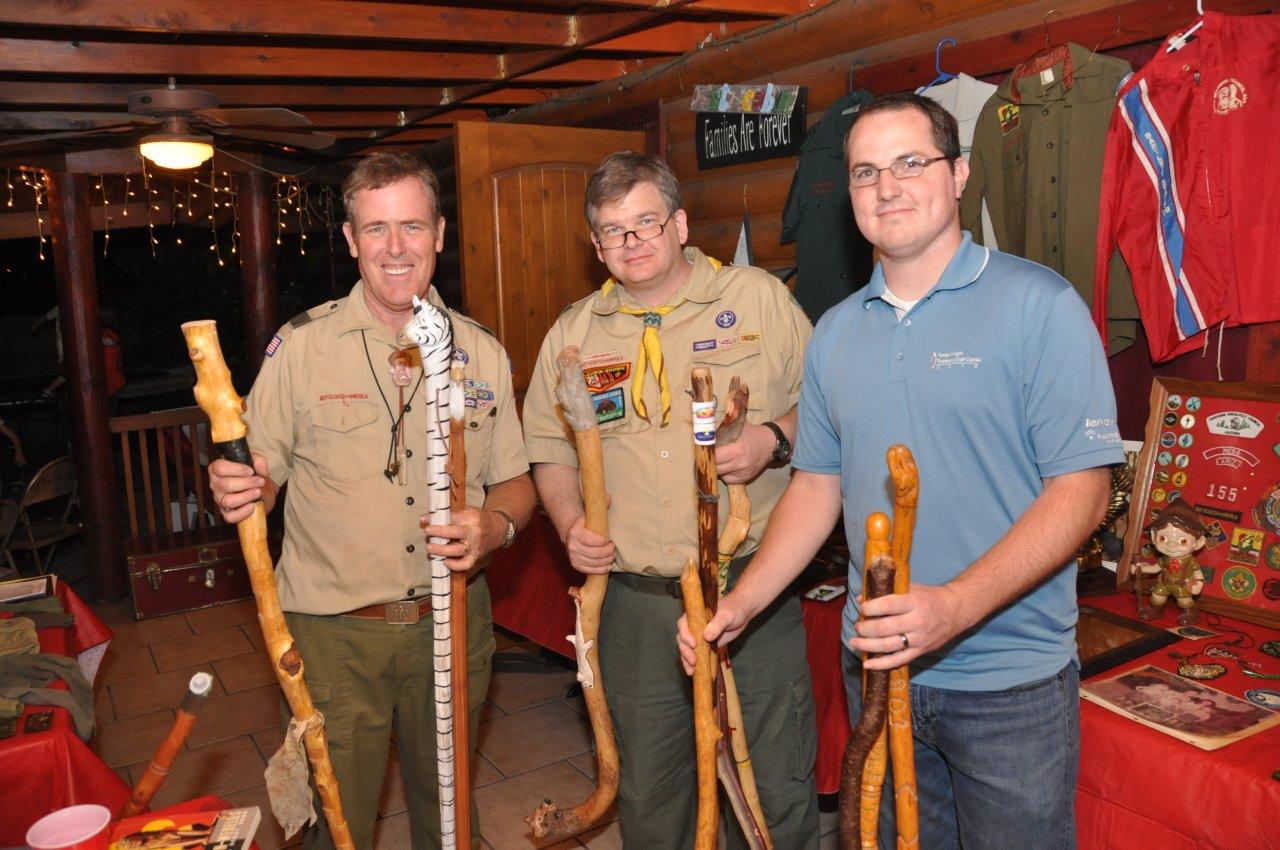
BSA Image by Patrick Adams
(The image above is of Christine Salisbury, Program Director for the Mid-America Council. It was taken when she was a District Executive and visited the BSA's National Center whereby she got to sit behind the Chief Scout Executive's desk. A graduate of Kansas State University with a master’s degree in architecture, she was a Venturing Silver Award recipient. )
In locating possible articles for the now-discontinued American Scouting Digest magazine in 2005, I came across this. This was written in 1998 but the advice is still valid for today's BSA entry-level professional...I thought so anyway. I don't know if Stuart Snook is still a professional (I hope so) but I thought I would share this with all of you. Those of you not associated with the BSA may find this information globally useful to your entry-level managers and leads. If you do find it useful, you're welcome...
Stuart Snook asked the Scouts-L youth programs discussion list before he leaves for PEI (Professional Educational Institute, the BSA's professional training laboratory) in Arlington, Texas:
What can I do to make me a better DE? Granted you do not know me, but what qualities have the DEs that you liked, possessed? Stuart, first off, congratulations and welcome to the honorable profession of Scouting!! I hope that you find your work with your volunteers a valuable experience and wish to offer to you (and to you others out there) some advice from someone that have done your role part-time for almost three years in several locations, whom someday will want to *do it fulltime* (when the time is right and the location is right), and someone that have observed and worked alongside professionals for many, many years as a youth and later as an adult. I won't expound on these too much as to make the posting as short as I can (WHAT!! THIS ISN'T MIKE WALTON SAYING THIS!!! MUST BE AN IMPOSTER!!! grinning) :

Volunteer are professionals
Treat your volunteers as "professionals". They are; many of them come to Scouting a long time before you have, have done countless jobs that today would be "considered part of your job description" and will be around long after you transfer or leave the profession. Note that I didn't say "do what they say", but rather I'm asking you to "take what they know as good advice". Your Commissioners, for instance, know a lot about the overall Scouting program as well as individuals that make up the leadership of that unit. In other words, they know what makes that unit "work" (or not). There are times where their advice will make sense and you'll wonder what you'll do without them; and other times in which you'll have to decide for yourself the appropriate courses of recommendation or action.
Know your territory. Not just the "towns and cities" which makes up your District, but the PEOPLE AND EVENTS which makes your District different from your peers' Districts.
This means that you'll go to have to spend some time in your District doing NON-SCOUTING programs and events. Do it, even if you "don't see the payoff" right away. Much of your job depends on you being able to identify and work with the right volunteer for the right role in the right position at the right time (you'll hear that phrase during PEI sometime...be listening for it!).
Know your District's makeup. Know how your District is structured, not just "we have 34 Cub Scout Packs,....etc.". Know that your District has 6 Cub Scout Packs in town A, two in town B, etc. Know (from your four-pound binder; you DO have one, right??) who's doing what in your District: each unit leader, each chartered partner, each committee chair.
Don't commit this stuff to memory...you won't be able to. Scouters average two and a half years in a job says the BSA...

Wear the uniform
Wear the field uniform as much as possible. One of the things I appreciated from Chief Scout Executive Ben Love, was his insistence that professionals "wear the same uniform as our volunteers". This helps to bond that "valley between professionals and volunteers" as well as to remind you of your community with those many volunteers and their youth that you represent on a day-to-day basis!
The field uniform IDs you as a "leader within the BSA"...use it to your (and your District's) advantage. The only thing that the coat and tie tell a volunteer is that you're an administrator, and they know that.
Wearing the field uniform also keeps you from "temptation". I've seen a lot of professionals during my long experience decide to "stop by and get a drink" after work or before they head to a unit or District meeting. They did it because they were wearing a suit and tie, which doesn't label them anything but yet another "businessman". Try going into a bar or someplace you don't need to be in a BSA field uniform and see who notices!! (broad smile)
Represent and set a positive example for the BSA, your Council, and your volunteers wherever you go. This goes well beyond the Scout Executive Code, Stuart.
To a lot of volunteers, YOU ARE THE BSA and only come around "when you want money or volunteers". That's not a very positive example. You should be visiting your units once a quarter. That EVERY UNIT once a quarter. You can do it...I did it, and at one time I had 66 units in a ten-county area! You need to become "our District's Executive, the man that comes and sees how we're doing and how he can help us out" and not "that Council rep that comes ...come to think of when WAS the last time he was around??" Listen to your volunteers, Stuart...even those that resent your presence. They are telling you -- the BSA -- things that you need to know about. Act upon the most important, immediate things that YOU CAN DO NOW. Give them answers NOW, even if that answer is "Hey, I'm sorry...my binder doesn't have any answers about that and I don't know. Can I call/email/fax/write you and give you the answer?" AND DO IT AS SOON AS YOU HAVE THE ANSWER!
Those other issues and questions, hand them off to your District's Commissioner staff and in particular, that unit's Commissioner. Remember, they are "professionals" too....they've been trained and they've been doing their jobs for a long time. They are great resources.
Even when it hurts
Even when it hurts, smile and always be willing to do "manual labor". There's a lot of places where I literally gritted my teeth to go to; the Scouter that "doesn't like me", "resents” what I do for a living", "wants to bend my ear, neck and throat", "would never let me get home at a decent hour", "always wants me to stop by his/her home after the meeting" and on and on.
You've GOT TO SMILE yet assert yourself that you don't have the time, that it would be inappropriate, that their job is just as important as yours, that you would love to hear those stories later onward and most of all, that first and foremost, pay or no pay, you are a SCOUTER just like they are. And let them know that although you have times just like they do in which you'd wished that you were on a beach somewhere, that you REALLY LOVE WHAT YOU ARE DOING.
Oh, the manual labor part?? Stuart, remember the times in which you've helped volunteers set up or tear down a meeting place?? You got to talk with them about their lives, and they got to see that "executive" actually pull up their sleeves and move chairs, put down plywood, etc. Volunteers respect and admire their "professional counterpart" more for ACTIONS than anything you will ever SAY to them or to their youth members. Don't be afraid to help a Cub Pack get "organized" for their Pack meeting or to help a Senior Patrol Leader to "get things ready" for a Troop meeting or Court of Honor.
Make it a point to write a PERSONAL letter to every new Eagle Scout, Arrow of Light and Exploring/Venture awardee in your District. I still have the letter sent to me by Doyle Fuller, our District's Executive, on the occasion of me becoming an Eagle Scout. It makes you more than "just the numbers guy" or "the man that recruits kids for Scouts"...
Those letters may not assist you, Stuart, but I can tell you that Doyle's brief letter to me, which I have framed with other elements making up my Eagle Scout award, is motivation some days to continue onward with Scouting when it got tough -- and trust me, it got tough for several years a while back!! I know that my current Scout Executive and the District Executives I work with appreciate that...
Always give your thoughts
Give your thoughts, feelings, and opinions on "how things are going" and ask them for theirs. Lots of volunteers and youth leaders look at you as "the enemy", the "spy for the Council" (like they view your Commissioners). Tell them how you envision things going.
You don't have to tell them about differences between you and your boss, nor do you have to go into glorious detail. You just need to be YOURSELF. In return, with time, your volunteers and youth leaders will share with you how they feel about what's going on and you can use this input to make the overall District's program even better for everyone!
Always look out for those Scouts that are interested in the profession and don't be afraid to tell them both the GOOD and BAD sides of being a career Scouter. That's how I learned what a professional Scouter really was all about, over french fries and a hamburger with my District Executive.
Those youth are going to grow up and become Scoutmasters, Commissioners, and perhaps your replacement.
Above all, Stuart: remember that you are the "day-to-day resident expert" of Scouting in your District. While others may have experience and expertise in various aspects of Scouting, you are the person that they look for the latest information, guidance and problem resolution dealing with our programs.
You "carry our program" to the public, to our Scouters, to our youth. When you don't know something, you should be willing to go to your boss, or his or her boss, or to the National resources to get the answer for us; and when you can't get it, tell them you can't get it and leave it to those volunteers to "use their resources" to get it for you and the rest of the District.
You work with volunteers
You work with the volunteers in your District and the youth in your District as PARTNERS, not as "leader". They elect a leader...the District's Chair and Commissioner as leaders. You manage the program in your District...not to lead the District, but to "carry the program" for the District's volunteers. That's what many volunteers want from their professionals, and which makes the difference between being called "the District's Professional" and "Stuart Snook, our DE".
And believe me, every time they used your title in front (or behind) of you, you'll smile. Not because "you've gotten the big head", but because they respect you as their "resident expert and manager of our District's program".
Settummanque!
(LTC) Mike L. Walton (settummanque, the blackeagle)
Victory Base, Baghdad, Iraq
Public Affairs Specialist (Social Media Team) at U.S. Air Force Materiel Command (AFMC)


